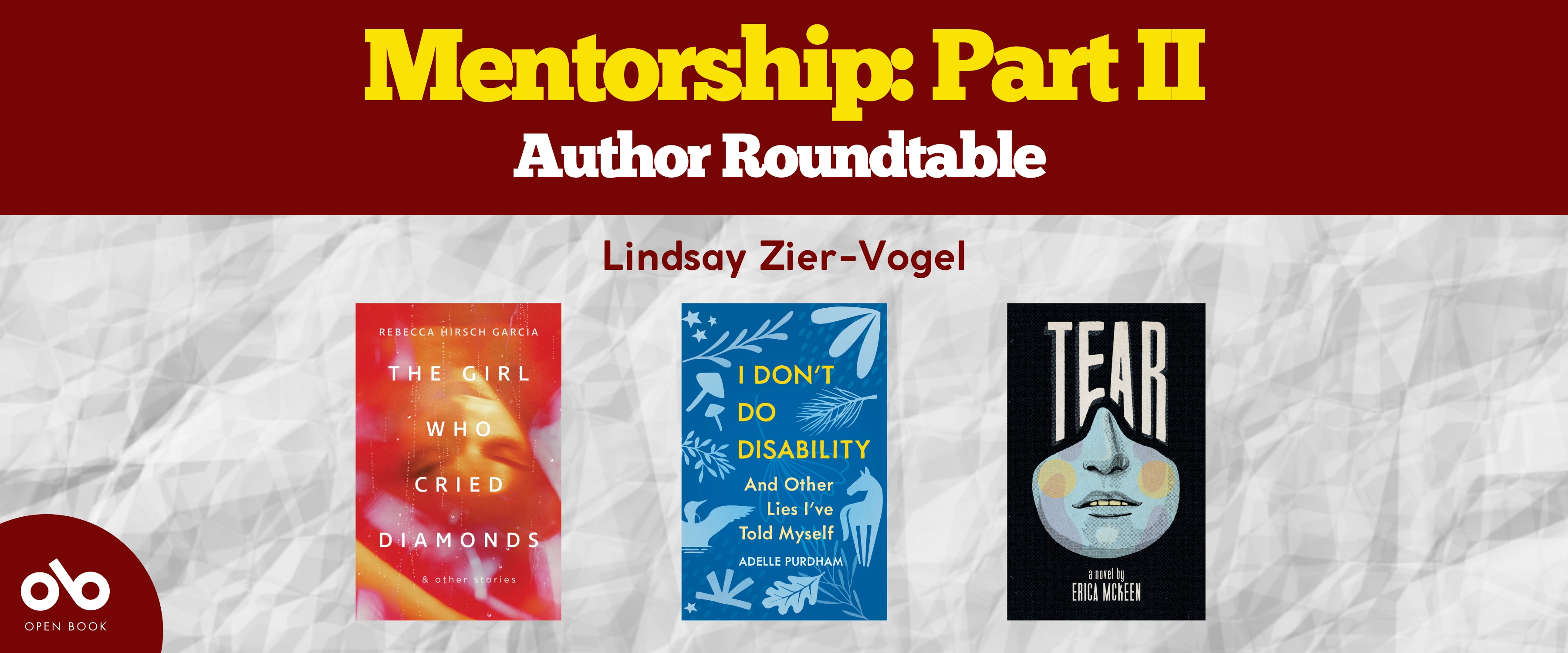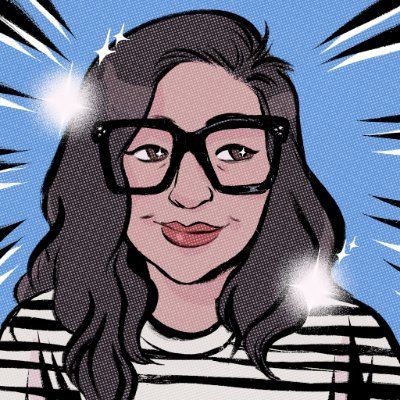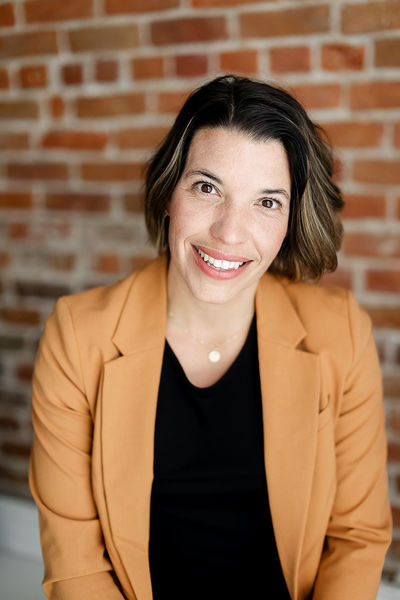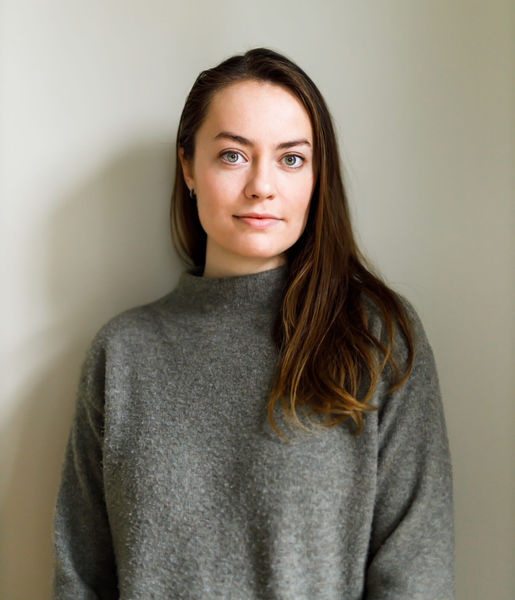Mentorship: Part II - Author Roundtable
By Lindsay Zier-Vogel
After chatting with Rudrapriya Rathore, the founder and manager of the Flying Books Mentorship Program about the value of having a mentor, I turned to fellow authors to chat about what mentorship has looked like for them and their projects.
Rebecca Hirsch Garcia’s The Girl Who Cried Diamonds & Other Stories came out in 2023 with ECW Press; Adelle Purdham’s memoir-in-essays, I Don’t Do Disability and Other Lies I’ve Told Myself, is forthcoming with Dundurn Press this November, and Erica McKeen’s Tear was published with Invisible Publishing in 2022, and her newest novel, Cicada Summer, is out this June.
*
Lindsay Zier-Vogel:
How did you find your mentor?
Rebecca:
I found my mentor, and now editor, Jen R. Albert, through an open call for mentees from publishing house, ECW. It was posted on Twitter and that, and another opportunity, were things I applied to around the same time in late 2020. I was rejected from the first mentorship and I remember thinking, well the ECW is the one I want anyway. I was excited to be chosen for the program, but it was actually Jen who responded to my work and chose to mentor me.
Adelle:
I sought professional mentorship to write I Don’t Do Disability and Other Lies I’ve Told Myself, which I found through established learning institutions. I worked with three incredible mentors: Jane Silcott, Cooper Lee Bombardier, and Ayelet Tsabari during The University of King’s College MFA in Creative Nonfiction program. I also had the pleasure of working with Lorri Neilsen Glenn through Sage Hill Writing’s Online Summer Course in Creative Nonfiction.
Erica:
I found my mentor through Western University's creative writing program. After completing a creative writing thesis project in my fourth year of undergraduate studies at the university, my supervisor, Aaron Schneider, offered to continue working on the project beyond the scope of the thesis requirements (and beyond my graduation, for that matter). The project we worked on together eventually became my debut novel, Tear.
Lindsay:
How did working with your mentor change or shape your project?
Rebecca:
Even though I knew they would be a hard sell I was really committed to the idea of publishing a short story collection. Jen really liked the stories but she also pushed me to include more. Mother, which was a story that eventually was published in The Dark before appearing in my collection, was one she especially championed. It was a story I showed her almost as an afterthought that she thought was strong. She was even the one who suggested I submit to The Dark. She also greatly shaped my novella, Woman Into Cloud, which is the final piece in the work. She wasn't afraid to gently and kindly tell me it needed more work and we had built up such a good relationship by that time I really respected and trusted her editorial notes.
Adelle:
Working with these mentors shaped I Don’t Do Disability and Other Lies I’ve Told Myself in innumerable ways. When I began the MFA program, I knew my book concept and I had a sense of the themes I was going to be working with (disability parenting, motherhood, and the female experience), but what every writer needs is feedback on what they’ve actually produced, the words on the page. My mentors offered in-depth edits on the individual essays, and we discussed more broadly how the pieces were coming together to form a book. Additionally, the feedback I received from Jane, Cooper and Ayelet helped me discern which essays were publication-ready, and which still needed work. When it came to tackling revisions, they would point me in the right direction. Jane, Cooper, and Ayelet were my first editors, but as mentors they also answered my questions on craft, and the business of writing and book publishing.
By the time I attended Sage Hill Writing, Lorri Neilsen Glenn shepherded me through the end of my project, and, with her encouragement, I sent my book out to publishers at the just right time. Shortly after, I received my book deal.
Your CanLit News
Subscribe to Open Book’s newsletter to get local book events, literary content, writing tips, and more in your inbox
Erica:
Working with Aaron helped me to understand the full scope and potential of the project. Before Aaron's involvement, I envisioned Tear as a novella, though I had dreams of expanding it to novel length that I didn't feel intellectually ready to engage with. Aaron pushed me to write more--a sheer matter of bulk--than I originally thought I was capable of.
Lindsay:
What was the most surprising thing about your mentorship?
Rebecca:
Prior to my ECW mentorship, I'd been in arts-based mentorships before that hadn't gone well. A lot of the time in these programs the mentors are artists themselves and the mentorship is more funding for them and something to include on their resume. They don't have a particular passion for mentoring. I had really been burned by these type of experiences so I think what surprised me the most and what I was most grateful for was how much I felt understood by Jen and how generous she was with her time. She genuinely did want to help me and fought to give me opportunities. When I was being mentored by her, I was at a frustrating point where I felt my writing was solid but I wasn't exactly sure how to approach it from a business point of view. She helped me with that while still being supportive, generous, and critical, in the best sense, towards my work.
Adelle:
Every mentor has a different approach, and mentorship style; depending on the stage that you’re at, not every mentor is going to be the right fit for you and your project. I was pleasantly surprised by the variety of approaches used and was unprepared for how much I missed working with mentors once those experiences were over. But, there comes a point when you’ve gotten what you need from mentors for a certain project, and it’s time to finish what you set out to accomplish on your own.
Erica:
The biggest surprise was how much I didn't know--not in terms of the act of writing itself, which I had been doing since I was young, but with regards to submissions and the politics of the broader CanLit community. Coming straight out of an English degree, my head was full of theory and classic literature; I had hardly read anything published in the last fifty years. I was (naively) surprised to see how much Aaron's knowledge of the contemporary writing community came in useful, as well as his awareness of independent publishers, which eventually led me to Invisible Publishing, who picked up Tear from the slush pile.
Because I don't come from an artistic family and had spent no time within a literary community, I doubt my first book would have come so early into fruition without a mentor's guidance.
Lindsay:
Do you have any advice for other authors seeking mentors?
Rebecca:
If a mentor isn't giving you what you need it's fine to call it quits and walk away. This might be for personality reasons, timing reasons, or them just not understanding your work and what you're trying to achieve. I'll also add that as a mentee it's important to hold up your end of the bargain too! Communicating with your mentor, respectfully pushing back on their suggestions, and always being professional and timely are all part of the process.
Adelle:
Know your goals. Perhaps you want to improve an aspect of your craft or ready a manuscript for publication? When seeking a mentor, know what your specific goals are for the mentorship and find a mentor who meets that skill set. Work with the mentor who has demonstrated those skills in their own work or as an experienced editor/teacher. If your goal is publication, consider finding a mentor who has published a book in the same genre of writing in which you want to publish. While it’s possible for a fiction writer to mentor a creative nonfiction writer, for example, the mentor who has published in CNF is going to be better positioned to give tailored advice about the genre they know intimately.
__________________________________________________
More about the featured authors:
Rebecca Hirsch Garcia lives in Ottawa, Ontario. She is an O. Henry Award winning writer and the author of The Girl Who Cried Diamonds & Other Stories. She is currently at work on her debut novel, Other Evolutions. She can be found on X (Twitter) and Instagram at: @rhirschgarcia.
Adelle Purdham is an author, educator, and parent disability advocate based in Nogojiwanong/Peterborough, Ontario. She holds an MFA in Creative Nonfiction Writing from the University of King’s College and is a qualified French teacher. Her memoir-in-essays, I Don’t Do Disability and Other Lies I’ve Told Myself, is forthcoming with Dundurn Press on November 5th, 2024. Her poetry and prose appear in anthologies (Good Mom on Paper, Book*hug Press), literary journals (The Humber Literary Review), newspapers (The Toronto Star), magazines (3.21: Canada’s Down Syndrome Magazine) and online (Brevity’s Nonfiction Blog). Adelle’s essays are finalists in several literary contests, including: The Writer’s Union of Canada’s Short Prose Competition, EVENT Magazine and The Fiddlehead’s Creative Nonfiction Contests. Adelle is founder of The Write Retreat and a sessional Course Instructor at Trent University—Durham where she teaches Creative Writing. www.adellepurdham.ca
Erica McKeen is a Canadian fiction writer. She is the author of two novels, Tear (Invisible Publishing, 2022) and Cicada Summer (W. W. Norton & Co.), which will be published on June 18, 2024. Her work has won the Rakuten Kobo Emerging Writer Prize, been chosen as a finalist for the ReLit Awards, and been selected as a Globe and Mail best book. She lives in Vancouver, British Columbia, where she works as a teacher and librarian.
The views expressed by Open Book columnists are those held by the authors and do not necessarily reflect the views of Open Book.
Lindsay Zier-Vogel is an author, arts educator, grant writer, and the creator of the internationally acclaimed Love Lettering Project. After studying contemporary dance, she received her MA in Creative Writing from the University of Toronto. She is the author of the acclaimed debut novel Letters to Amelia and her work has been published widely in Canada and the UK. Dear Street is Lindsay’s first picture book, and is a 2023 Junior Library Guild pick, a 2023 Canadian Children’s Book Centre book of the year, and has been nominated for a Forest of Reading Blue Spruce Award. Since 2001, she has been teaching creative writing workshops in schools and communities, and as the creator of the Love Lettering Project, Lindsay has asked people all over the world to write love letters to their communities and hide them for strangers to find, spreading place-based love.






